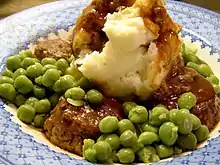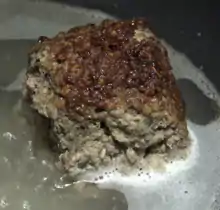 Faggots, gravy, mashed potatoes and marrowfat processed peas | |
| Course | Main dish |
|---|---|
| Serving temperature | Hot |
| Main ingredients | Pig's heart, liver, fatty belly meat or bacon |
Faggots are meatballs made from minced off-cuts and offal (especially pork, and traditionally pig's heart, liver, and fatty belly meat or bacon) mixed with herbs and sometimes bread crumbs.[1] It is a traditional dish in the United Kingdom,[2][3] especially South and Mid Wales and the English Midlands.[1][4][5]
Faggots originated as a traditional cheap food consumed by ordinary country people in Western England, particularly west Wiltshire and the West Midlands.[6] Their popularity spread from there, especially to South Wales in the mid-nineteenth century, when many agricultural workers left the land to work in the rapidly expanding industry and mines of that area. Faggots are also known as "ducks" in Yorkshire, Lincolnshire, and Lancashire, often as "savoury ducks". The first use of the term in print was in the Manchester Courier and Lancashire General Advertiser of Saturday 3 June 1843, a news report of a gluttonous man who ate twelve of them.[7]
Preparation and serving

Commonly, a faggot consists of minced pork liver and heart, wrapped in bacon, with onion and breadcrumbs. Often, the faggot is cooked in a crock with gravy and served with peas and mashed potato. The mixture is shaped by hand into small balls, wrapped with caul fat (the omentum membrane from the pig's abdomen), and baked. Faggots may also be made with beef.[8]
Another variation of the faggot is pig's fry (testicles) wrapped in pig's caul: the pig's fry and boiled onions are minced (ground) together, then mixed with breadcrumbs or cold boiled potatoes, seasoned with sage, mixed herbs and pepper, all beaten together and then wrapped in small pieces of caul to form a ball. They are baked in the oven, and usually served cold.[9]
Production
The dish gained in popularity during the rationing in World War II, but declined over the following decades.[8] The "nose-to-tail eating" trend has resulted in greater demand for faggots in the 21st century; British supermarket chain Waitrose once again sold beef faggots from 2014 onwards[8] and in 2018 it was estimated that "tens of millions" of faggots were eaten every year.[10] Faggots are often home-made, and are found in traditional butchers' shops and market stalls, though many UK supermarkets stock mass-produced frozen faggots, often made of liver and onions rolled into meatballs in a sauce, different from traditional faggots, which have a coarser texture and contain far less water.
A popular dish is faggots and peas. This combination is common in the Black Country area of the West Midlands. It is still common to see small butchers' shops in the area selling faggots made to their own recipe cheaply.
Double meaning
The use of the word "faggot" has caused misunderstanding due to its American English meaning as a pejorative term for a homosexual man. In 2004, a radio commercial for the UK supermarket chain Somerfield, in which a man rejects his wife's suggested dinner saying "I've got nothing against faggots, I just don't fancy them" was found to have been innuendo which breached the Advertising and Sponsorship Code and was banned by the industry regulator Ofcom.[11][12] In November 2013, it was reported that British Facebook users had been blocked temporarily for using the word, in its culinary sense, on the website. Facebook said that the word had been misinterpreted.[13][14]
See also
- Frikadeller
- Rissole – European dish of meat covered in pastry
- Scrapple – American pork offal mush
References
- 1 2 "The West Midlands, Warwickshire and Northamptonshire". Great British Kitchen. Retrieved 19 January 2010.
- ↑ "Family of faggot fans fly the flag". BBC News Online. 27 January 2003. Retrieved 30 April 2011.
- ↑ "Neath is Wales's Faggots 'n' Peas capital". Wales Online. 11 August 2009. Archived from the original on 2 February 2009. Retrieved 19 January 2010.
- ↑ "The Dangers of Bad Teeth". The Times. 6 January 1914. p. 2.
A 'faggot' was described as being composed of pieces of meat, with fat and gristle in it. A verdict of 'Death from natural causes' was returned.
(payment required) - ↑ "Doctor warns the faggot eaters". The Times. 23 May 1968. p. 4. (payment required)
- ↑ Lemm, Elaine. "What are Faggots". Britishfood.about.com. Archived from the original on 18 May 2011.
{{cite web}}: CS1 maint: unfit URL (link) - ↑ "Savoury Ducks". The Foods of England. 22 May 2015. Retrieved 7 November 2015.
- 1 2 3 "Waitrose brings back faggots". London Evening Standard. 18 February 2014. p. 24.
- ↑ Lizzie Boyd, ed. (May 1979). British Cookery: A Complete Guide to Culinary Practice in England, Scotland, Ireland and Wales. Viking Press. ISBN 0-87951-087-0.
- ↑ "Faggots and groaty dick: Why some foods travel and others don't". BBC News. 2 September 2018. Retrieved 2 September 2018.
- ↑ "Advertising complaints bulletin, Issue number A13" (PDF). Ofcom. 5 July 2004. p. 10. Archived from the original (PDF) on 30 September 2007.
- ↑ "Ofcom bans 'derogatory' faggot advert". The Daily Telegraph. 5 July 2004. Retrieved 28 June 2018.
- ↑ Prynne, Miranda (1 November 2013). "Man banned from Facebook for liking faggots". The Daily Telegraph. Retrieved 11 December 2013.
- ↑ "Faggots and peas fall foul of Facebook censors". Express & Star. 1 November 2013. Retrieved 11 December 2013.